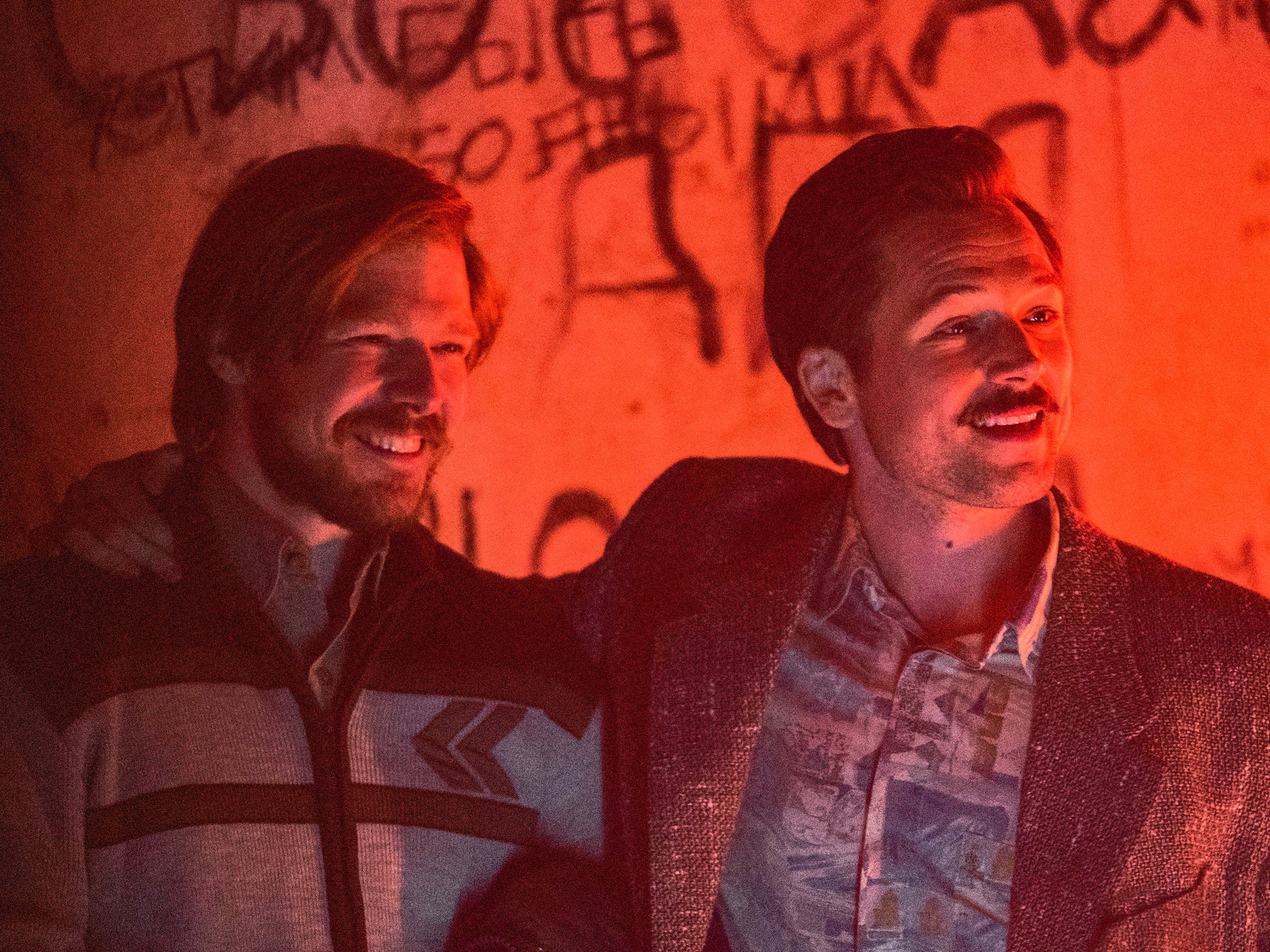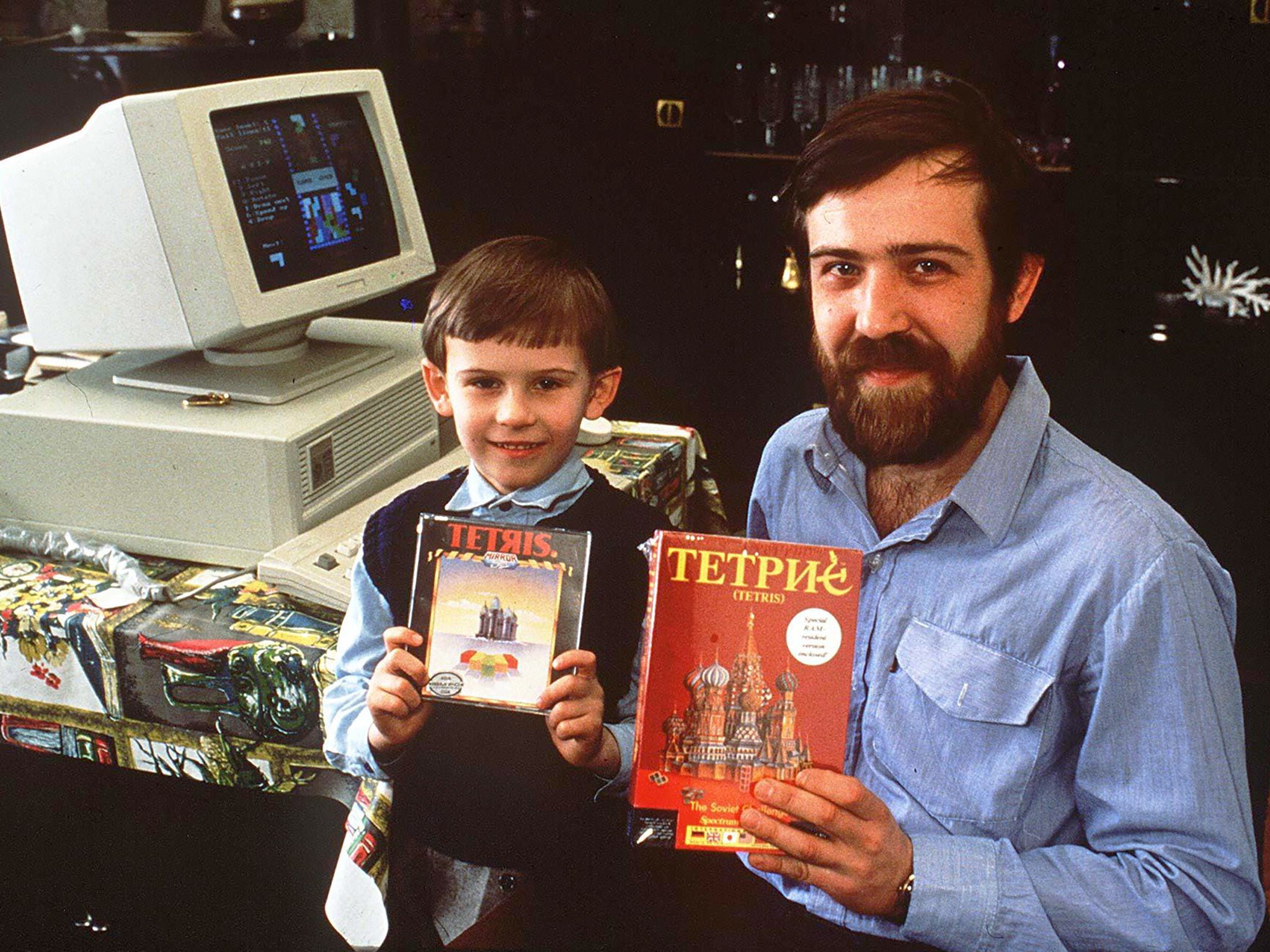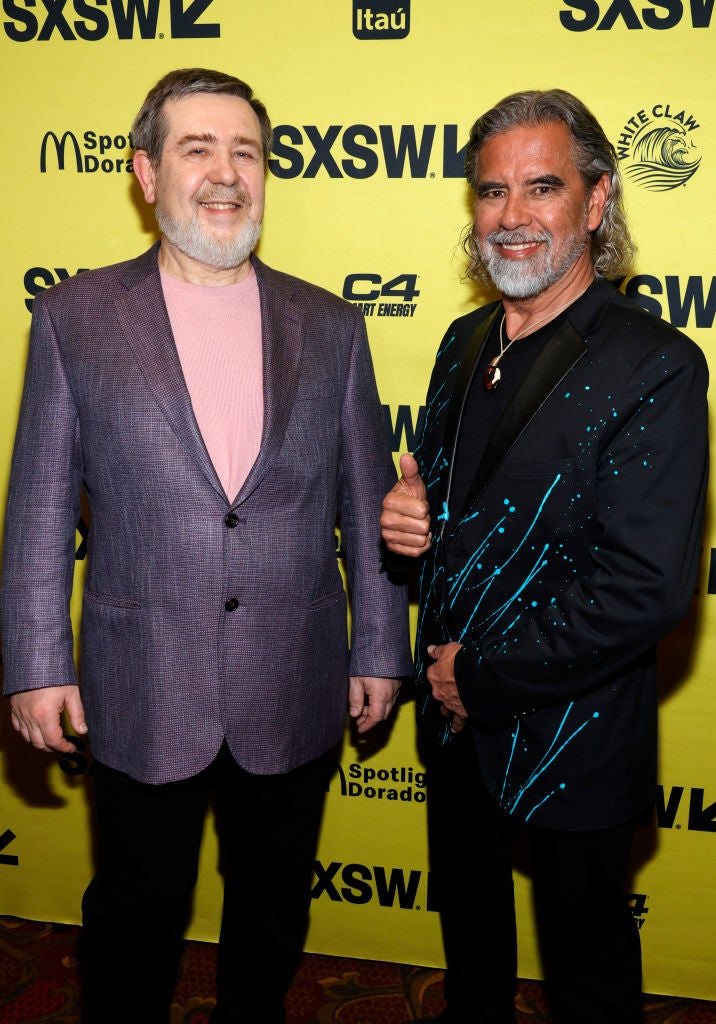‘I didn’t know if I’d end up in a gulag’: The extraordinary true story behind the Tetris movie
Gorbachev. Nintendo. Robert Maxwell. All embroiled in the making of an elegantly simple video game that’s served as a blissful time-filler for four decades. As Apple TV+ releases the biopic ‘Tetris’, James Mottram speaks to the game’s inventor and first key investor, along with the film’s star Taron Egerton

With its coloured blocks tumbling through the air as players frantically jigsaw them together, Tetris remains one of the world’s most elegantly simple video games. Even now, 39 years on from its creation. But not many know the story behind the game. When filmmaker Jon S Baird (of Stan & Ollie and the Irvine Welsh adaptation Filth) first heard it, after reading the script for what became his Apple TV+ film Tetris, he did a double take. “I was like, ‘Is that really true? Wow, that is crazy!’”
Crazy doesn’t even begin to cover a story that ties together the Soviet Politburo, the late media mogul Robert Maxwell (that’s Ghislane’s dad, for the uninitiated), and the launch of Nintendo’s iconic GameBoy – as various interested parties all scrambled to get the rights to Tetris. Invented in 1984 by Russian coder Alexey Pajitnov, the game’s title came from “tetra” (meaning “four”, a nod to the blocks on screen) and “tennis” (one of Pajitnov’s favourite sports). Gradually, this fiendish new invention made its way to a Las Vegas consumer electronics show, grabbing the attention of Henk Rogers, an American entrepreneur and former game designer who gambled everything on chasing down the global rights to it.
In the film, Rogers is played by British star Taron Egerton (of Rocketman and the Kingsman movies), while Russian actor Nikita Yefremov takes on the role of Pajitnov. Like Baird, Egerton could barely believe the story. “I was very keen to dissect what was truth and what was fiction and what was the Hollywood zhuzh,” he says. “I was sort of amazed to learn that a lot of what is featured in the story did actually happen. Particularly my character’s very cavalier attitude to go into this part of the world and try and procure the rights to a video game.”
Under copyright law, the Soviet Union had a state monopoly on imports and exports. And Soviet researchers – Pajitnov was working for the Soviet Academy of Sciences at the time – were certainly not permitted to profit from their creations. But with no paperwork or formal introductions, Rogers went to Moscow to negotiate with ELORG, the state-owned company dealing with the import/export of computer hardware. “I looked at it as an adventure game,” he tells me today. “That’s the way I look back at it. I could have taken a wrong turn anywhere and fallen into the pit of lava.”
Rogers arrived with just a tourist visa. “I didn’t know whether I was going to end up in a gulag, or whether they were going to even let me in,” he says. “I was a fish out of water. I had never been to a Communist country before. I’d never been behind the Iron Curtain before. I just didn’t know what I was doing. And that part of it was really exciting.”
Moscow in the mid-Eighties was a hostile environment for a capitalist like Rogers. “You can see why it could potentially be quite incendiary, given those separate factions’ different views of the world,” says Egerton. Rogers found it “a very strange place” to visit. “I didn’t get a smile out of anybody.”
Do I view Robert Maxwell as the villain of the film? He’s certainly depicted as somebody of less than one hundred percent sound morals. But then everybody is acting out of self-interest
The one person he did get a smile out of – eventually – was Pajitnov, who recognised Rogers as a kindred spirit. “He wasn’t the first adventurer who was seeking Tetris at that time,” says the Russian today. “But, when I realised that he is a game designer as well, it immediately changed everything in my heart, because he was the very first colleague in my life – there were no game designers in the Soviet Union at that time.” They even worked on improving the game together. Rogers was instrumental in giving the player higher scores if a single, double, treble or quadruple line is completed.
The game’s rather basic original incarnation was understandable. “The original Tetris was designed specifically for the computer platform,” explains Pajitnov, who had never seen any kind of gaming console in his life. Rogers, on the other hand, had been given a sneak preview of Nintendo’s revolutionary new product: the GameBoy. After Rogers convinced the top brass at Nintendo that they should package this hand-held gaming console together with Tetris, it proved to be the game’s gateway to landing into the hands of millions of consumers.
Pajitnov and Rogers would eventually form the Tetris company in 1996, managing the world rights to a game that has now sold a staggering half a billion units, making it one of the biggest-selling games ever. Yet at the time, Rogers faced intense rivalry for the rights – not least from Robert Maxwell through his computer game outfit Mirrorsoft. He’s played in the film by Roger Allam, ranting like an egotistical tyrant and claiming to be friends with the then Soviet leader Mikhail Gorbachev. “Robert Maxwell is portrayed in pretty much the way he was in real life,” confirms Rogers. “We felt his pressure in Moscow.”

While Maxwell was trying to lean on Gorbachev to cancel the ELORG contract with Nintendo, he was ultimately heading for a total meltdown. As the film touches upon, he’d accumulated debts in excess of $5bn – meaning in reality he had no money to buy Tetris. Instead, he stole $900m from his companies’ pension funds, shortly before his mysterious death on a luxury yacht in November 1991. “Do I view him as the villain?” muses Egerton. “I mean, he’s certainly depicted as somebody of less than one hundred per cent sound morals. But then everybody in the movie… they’re all just sort of acting out of self-interest.”
Of course, the collapse of the Maxwell machine wasn’t the only empire imploding. At the time, Gorbachev’s “perestroika” was underway, the policy of decentralising economic decision-making to improve efficiency. Tetris got swept up in this shift, a symbol of the new openness between East and West. “All these people down below had instructions from Gorbachev to actually do business and make money and do the right thing rather than just bow to political pressure,” says Rogers. “If I’d have been there a year earlier, I don’t think I could have pulled it off. But I came at the right time. Right as the Soviet Union was changing into something else.”
Originally, the title of Baird’s film was “Falling Blocs” – a neat reference to Tetris itself as well as the 1991 crumbling of the Soviet empire, as Eastern bloc countries veered away from centralised rule. It was this aspect of the story that gripped Baird, who studied politics and international relations at the University of Aberdeen and lived through the era. “Myself as a teenager, it was a very scary time – I remember seeing [US president Ronald] Reagan and Gorbachev in these summits in Reykjavik,” he says. “But before that, with [Russian leaders Leonid] Brezhnev, and [Nikita] Khrushchev, things were really, really tense.”

It’s why Baird feels his movie is timely right now, given the situation in Ukraine. “People who don’t remember the fall of the Soviet Union, who are too young… because of this horrible conflict in Ukraine [they] will get an idea of how harsh East and West relations were and the potential for a full-on war,” he says. “We lived with that, and I think kids now have, ironically, got more of an idea of what it was like back then through this terrible war.”
The question remains, though: how accurate is Tetris to the real story? Pajitnov admits that when he first read the script, it felt “like an action movie” – and Baird even admits the final car chase through Moscow, as Rogers races to the airport, was a total embellishment. Most of all, Rogers wanted to ensure his “impossible mission” to Moscow remained intact. “I didn’t want that to be lost in the Hollywood-ness of the movie. That was what worried me the most. [I kept thinking] ‘I hope somebody doesn’t screw it up.’ And they totally didn’t.”
It’s understandable, given how much this game means to them both. “I am still taking care of my baby, of my game, of Tetris,” says Pajitnov, who is regularly asked by fans to autograph old-school Tetris cartridges for the Nintendo Entertainment System. As for the movie, Rogers has one wish. “What I hope people will take away from it is that friendship transcends political systems,” he says. “It transcends everything. The whole Soviet Union, the whole US, all the Cold War… that can all go take a hike because we’re friends.”
‘Tetris’ is in selected cinemas and streaming on Apple TV+
Join our commenting forum
Join thought-provoking conversations, follow other Independent readers and see their replies
Comments


Bookmark popover
Removed from bookmarks